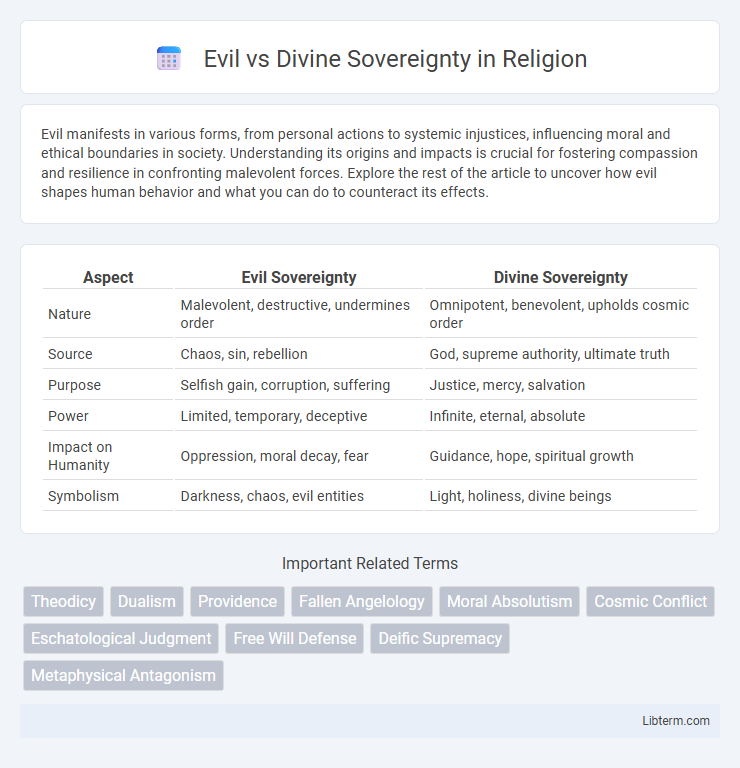Evil manifests in various forms, from personal actions to systemic injustices, influencing moral and ethical boundaries in society. Understanding its origins and impacts is crucial for fostering compassion and resilience in confronting malevolent forces. Explore the rest of the article to uncover how evil shapes human behavior and what you can do to counteract its effects.
Table of Comparison
| Aspect | Evil Sovereignty | Divine Sovereignty |
|---|---|---|
| Nature | Malevolent, destructive, undermines order | Omnipotent, benevolent, upholds cosmic order |
| Source | Chaos, sin, rebellion | God, supreme authority, ultimate truth |
| Purpose | Selfish gain, corruption, suffering | Justice, mercy, salvation |
| Power | Limited, temporary, deceptive | Infinite, eternal, absolute |
| Impact on Humanity | Oppression, moral decay, fear | Guidance, hope, spiritual growth |
| Symbolism | Darkness, chaos, evil entities | Light, holiness, divine beings |
Introduction to Sovereignty: Evil vs Divine
Sovereignty explores the ultimate authority and power governing existence, contrasting evil as chaos and destruction against divine sovereignty embodying order and benevolence. Evil sovereignty manifests through tyranny, moral corruption, and rebellion against cosmic law, while divine sovereignty reflects righteousness, justice, and immutable spiritual governance. Understanding this dichotomy reveals how contrasting forces shape ethical frameworks and influence human conceptions of authority and fate.
Historical Perspectives on Sovereignty
Historical perspectives on sovereignty reveal a complex interplay between concepts of evil and divine authority, notably during the medieval and early modern periods when monarchs claimed divine right to justify absolute power. Thinkers like Thomas Hobbes emphasized sovereign authority's necessity to prevent chaos and evil, while contrasting views in theological discourse framed sovereigns as either instruments of divine will or embodiments of tyranny. This dynamic shaped political theories and governance structures, influencing the legitimacy and moral grounding of sovereign power throughout history.
Defining Evil Sovereignty
Evil sovereignty refers to absolute power exercised through malevolent intent, characterized by oppression, injustice, and the prioritization of self-interest over communal welfare. This form of governance often relies on fear, manipulation, and the suppression of dissent to maintain control. Unlike divine sovereignty, which is rooted in moral authority and the pursuit of justice, evil sovereignty manifests through corruption and the erosion of ethical principles.
Characteristics of Divine Sovereignty
Divine sovereignty is characterized by ultimate authority, omnipotence, and moral perfection, ensuring that all creation operates under a just and purposeful order. It embodies absolute control over the cosmos while maintaining omniscience, allowing for the fulfillment of divine will without contradiction or error. This sovereignty upholds righteousness and benevolence, contrasting with evil by guaranteeing that every event aligns with a higher, moral plan.
Philosophical Debates: Good, Evil, and Power
Philosophical debates on Evil versus Divine Sovereignty explore the nature of good, evil, and the extent of divine power over moral order. Theodicy addresses how an omnipotent, omnibenevolent deity permits evil, questioning the coexistence of suffering with divine justice. Discussions often analyze free will, divine foreknowledge, and the problem of moral evil as challenges to traditional conceptions of divine authority and goodness.
Theological Interpretations of Sovereignty
Theological interpretations of sovereignty explore the tension between evil and divine authority by examining God's ultimate control over creation despite the presence of evil. Divine sovereignty asserts that God's will is supreme and purposeful, allowing evil as part of a greater plan that leads to redemption or moral growth. Different doctrines, such as Calvinism's predestination and Arminianism's free will, offer varying perspectives on how divine sovereignty interacts with human agency and the existence of evil.
Case Studies: Manifestations in History
The struggle between evil and divine sovereignty is vividly illustrated in historical case studies such as the Crusades, where religious zeal clashed with political ambition, shaping medieval geopolitics. The Salem witch trials exemplify how fear and superstition can corrupt justice under the guise of divine judgment, resulting in widespread persecution. Similarly, the reign of Emperor Nero reveals the dangerous consequences of tyranny masquerading as divine authority, highlighting the complex interplay between morality and power.
Ethical Implications of Sovereign Authority
Evil versus divine sovereignty centers on the ethical implications of sovereign authority, where the source and exercise of power determine moral legitimacy. Sovereign authority rooted in divine will emphasizes justice, benevolence, and the protection of human dignity, contrasting with evil sovereignty characterized by oppression, tyranny, and moral corruption. Understanding the ethical impact of sovereignty requires evaluating how power aligns with universal moral principles and affects societal welfare.
Modern Relevance of Evil and Divine Sovereignty
The modern relevance of evil and divine sovereignty is pivotal in ethical debates, where the coexistence of moral evil and an omnipotent deity challenges philosophical and theological frameworks. Contemporary discussions often explore how divine sovereignty can allow for human free will while addressing the problem of suffering and injustice in a world governed by a seemingly benevolent force. This ongoing discourse influences moral decision-making, law, and cultural perceptions of justice and accountability in diverse societies today.
Conclusion: Navigating the Dualities of Sovereignty
Evil and divine sovereignty represent contrasting forces shaping moral and cosmic order, each influencing human perceptions of justice and authority. Embracing the complexity of these dualities allows for a deeper understanding of sovereignty's role in balancing chaos and order within societies and spiritual frameworks. Recognizing that both aspects coexist prompts a more nuanced approach to governance, ethics, and metaphysical interpretations of power.
Evil Infographic

 libterm.com
libterm.com